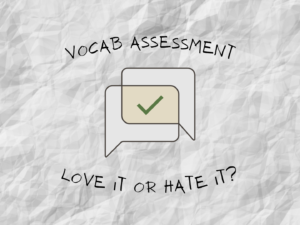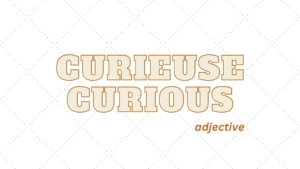
Vocabulary has always been one of those things about being a language teacher that I have struggled with. I see the need for vocabulary, however, I hated how I was taught it in school. The teacher would hand out a huge list of words, we were told what day a quiz for each section would take place and it was up to us to review and study for the quizzes. No matter what, I rarely succeeded on these tests, and yet, I could have detailed conversations using the vocabulary. So as a teacher, I do not like giving out the large lists or the vocab quizzes. I find I have flip flopped between the two spots on the pendulum. That changes now.

In their article Assessing Vocabulary in the Language Classroom, Coombe (2011) sheds light on some of the basic questions language teachers should ask when looking at how they are teaching and assessing vocabulary.
From what I have read, and continue to find on the internet on the topic of vocabulary assessment is that it is linked to assessment in general – whether in a language classroom or not. Additional questions I find myself asking as I plan out units and lessons include: What material is being covered in lessons? How are the in-class activities being completed? What age and level are the students? What is the purpose of the assessment – formative or summative? With some intentional thinking and planning these questions can be easily answered. Questions that may be a bit more difficult to answer quickly can include: How do I encourage my students to be motivated to learn the vocabulary? How do I encourage buy-in of my students during classroom activities? Am I wanting students to self-assess core competencies or am I wanting them to reflect on their learning and demonstration of a skill or curricular competency?
The questions that work as headers in the article are:
- How should I test vocabulary?
- Which kind of vocabulary should I test?
- Which format(s) should I use?
- How many itens should I include?
- How important is context?
- Are there any tools or resources that can help me?

This brings me to what does review and practice in the language lesson look like? I teach high school and while I am a student who makes lists and writes things over and over to remember, not all of my students learn like this. So I have come up with a few activities I have found useful for a variety of learning styles over the years.
- Have students fold an A4 unlined paper into 8. Unfold. In each square have students write a vocabulary word in this unit of study as well as draw the word as an image. If like me, students will have stick people in almost every box. Other, more artsy students may have mini masterpieces!
- Get active! Whether inside on a rainy day or outside when the first dry day arrives, getting students to complete small actions while making sentences using the vocabulary words – this includes using the word in context portion of learning vocabualary. This can be jumping jacks, hopscotch, hoola hooping, or skipping, even a type of Simon says game. Anything that gets students attaching an action to the words they are learning.
- Riddles. Even the simplest of riddles can be helpful to students as they practice and recall vocabulary words. I often will use riddles as an in-betweeen, before we get things started, or we have a few minutes left at the end of class activity. This can use current vocabuarly and previous vocabulary – another way of showing students that just because we learned vocabulary in a previous unit doesn’t mean we no longer use it in the current unit.
- Let’s talk about it! I regularly have students start classes with partner discussions in which they are asked to get out their vocabulary sheets, and use as many of the words as possible in their conversations. The focus in these conversations is vocabulary first, grammar second, and so if I overhear students making some grammar errors, I tend to overlook them and rather focus more on creating a safe space for students to practice using vocabulary. There are other times in the lesson when grammar, pronunciation, or other language concepts are the focus and therefore mentioned.
As usual, I am by no means an expert on assessment or vocabulary. What I am convinced of is that the days of assessing a student’s ability to memorize words or verb conjugations should be things of the past. Do students need to broaden their vocabulary? Yes. Do students need to know how to conjugate verbs to communicate effectively? Yes. But memorizing and fervently writing them on a paper before they are forgotten is not, in my opinion, a demonstration of the skill of communicating in an additional language.
Resources on this topic:
Brown, J. D. (2005). Testing in the Language Programs: A comprehensive guide to English language assessment. McGraw-Hill.
Coombe, C. (2011) Assessing Vocabulary in the Language Classroom.